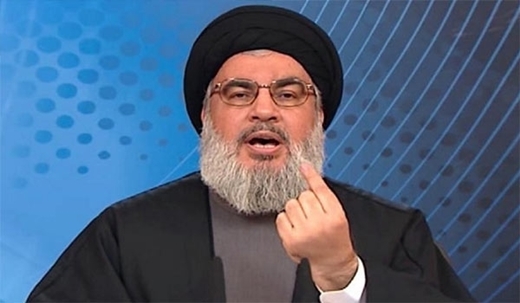Secretary General of Lebanon’s Hezbollah Resistance Movement Seyed Hassan Nasrallah lashed out at the US and Israel for making arbitrary use of Takfiri terrorism to undermine the Islamic nation.
“We are witnessing a new Nakba,” Nasrallah said in a televised address on Saturday.
“The Nakba of the Takfiri militants was first brought to the region by the British Zionist project, now it is the American Takfiri Zionist project, and America is using this to weaken the Ummah and tear it apart and to seize control of its capabilities,” he added.
Every year on May 15, Palestinians all over the world hold demonstrations to commemorate Nakba Day, which marks the anniversary of the forcible eviction of hundreds of thousands of Palestinians from their homeland by Israelis and the creation of the Israeli regime in 1948.
On May 15, 1948, Israeli forces displaced some 700,000 Palestinians, forcing them to flee to neighboring countries. Israeli soldiers also wiped nearly 500 Palestinian villages and towns off the map, leaving an estimated total of 4.7 million Palestinian refugees and their descendants dreaming of an eventual return to their ancestral homeland more than six decades later.
Battle for Qalamoun
Nasrallah praised the “victory” in Qalamoun as a major achievement for Lebanon, Syria, and the entire region.
The battles there took place from “hilltop to hilltop and from valley to valley,” he added.
Hezbollah, the Syrian army, and Syrian volunteer forces, as well as the locals in Qalamoun helped fighting the terrorists in the strategic area, he noted.
Referring to the major difficulties in the battle for Qalamoun, he said the high mountains and hills inside the area made the mop-up operation very difficult.
A total of around 300 square kilometers of the Syrian and Lebanese territory was retaken from the militants and some of their operation centers were also destroyed, Nasrallah added.
“The highest level of security was achieved for Syrian villages in Qalamoun and the same goes for Damascus-Homs road,” he said, adding; however, that as long as the militants are present in border areas, such as in Arsal outskirts and some parts of Qalamoun, there would be risks.
Nasrallah said Hezbollah fighters have cut off the supply lines of the militants from Lebanon to Syria.
He further described attempts by certain entities to pit Hezbollah against the Lebanese army as “foolish”.
The secretary general also criticized some Arab media for waging what he referred to as psychological warfare against Hezbollah. He added the media has overplayed the number of Hezbollah’s casualties.
“There have been thirteen Hezbollah martyrs in the battle so far,” he stated.
Nasrallah also stressed that the media was trying to portray the Takfiri militants as revolutionaries while they are in fact terrorists.
Since the most recent Syria-Hezbollah joint operations about nearly two weeks ago, al-Nusra Front Takfiri militants had been using Qalamoun mountainous region for transferring weapons and reinforcements from Lebanon into Syria, where they have been engaged in terrorist operations against the government.
Failure after failure
Turning to Yemen, he called for the condemnation of the US-backed Saudi aggression against the impoverished country.
He said the Saudi military campaign has failed to achieve any of its goals, saying Riyadh has gained nothing but “failure after failure.”
“This aggression won’t achieve its goals…. and it has failed in achieving its goals,” he said.
Saudi Arabia has been striking Yemen for 53 days now to restore power to fugitive president Mansour Hadi, a close ally of Riyadh.
[…]
World mum on rights violations in Bahrain
Touching upon the developments about the popular uprising in Bahrain, he slammed the violation of human rights in the Persian Gulf kingdom, saying that the people of Bahrain are facing torture and prison for their peaceful upraising.
“The situation in the prisons in Bahrain is very difficult, it’s not just against the most basic human rights and something awful is taking place… in light of international silence,” the secretary general added.
Anti-government protesters have been holding peaceful demonstrations across Bahrain since mid-February 2011, calling for an end to the al-Khalifa dynasty.
[…]
Power vacuum in Lebanon
On the future presidential election in Lebanon, Nasrallah said the power vacuum has reached a dangerous point, urging the Lebanese people not to pin their hopes on foreigners to make decisions for them in this regard.
“Take these matters very seriously, it’s very important and sensitive, discuss the ways out and raise solutions for the power vacuum,” he said.
The power vacuum is considered the longest since 1990, which marked the end of Lebanon’s civil war.
In Lebanon’s power-sharing system, the president must be a Christian, the prime minister a Sunni Muslim and the parliament speaker a Shiite Muslim. Any presidential candidate would have to receive the backing of the two main political blocs, the March 8 alliance and the rival March 14 alliance, to win the necessary majority from the legislature’s 128 members.
